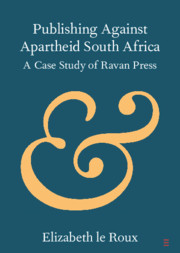4 results

Arming Black Consciousness
- The Azanian Black Nationalist Tradition and South Africa's Armed Struggle
-
- Published online:
- 25 May 2023
- Print publication:
- 08 June 2023
6 - The Movement for Colonial Freedom
-
- Book:
- Uniting Nations
- Published online:
- 08 July 2022
- Print publication:
- 28 July 2022, pp 152-183
-
- Chapter
- Export citation
Chapter 24 - Brecht in Southern Africa
- from Part III - The World’s Brecht
-
-
- Book:
- Bertolt Brecht in Context
- Published online:
- 28 May 2021
- Print publication:
- 10 June 2021, pp 208-216
-
- Chapter
- Export citation

Publishing against Apartheid South Africa
- A Case Study of Ravan Press
-
- Published online:
- 08 December 2020
- Print publication:
- 07 January 2021
-
- Element
- Export citation


